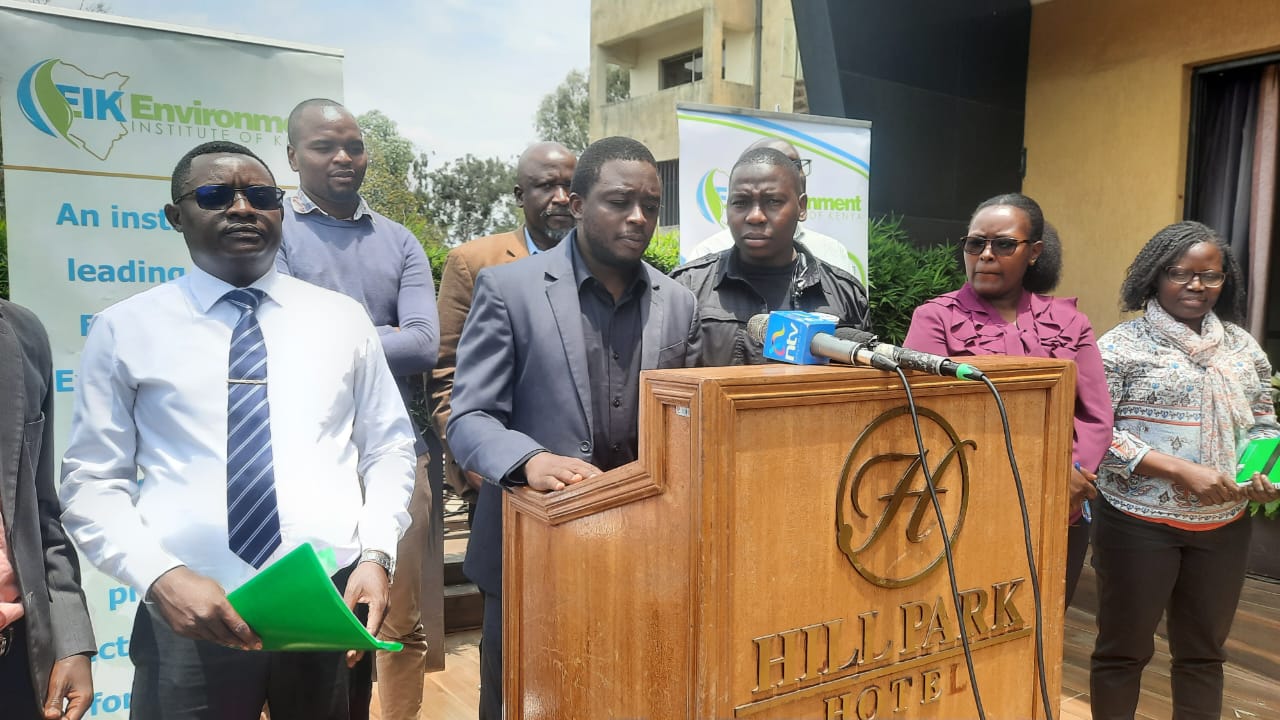 A section of EIK leadership led by CEO Titus Mutuku (in White)
and chairperson Alex Mugambi during a press conference in Nairobi on September
5, 2025.
A section of EIK leadership led by CEO Titus Mutuku (in White)
and chairperson Alex Mugambi during a press conference in Nairobi on September
5, 2025.The Environment Institute of Kenya (EIK) has warned that more than 10,000 environmental experts are struggling to secure livelihoods as a newly launched system continues to frustrate licensing operations.
This is after the National Environment Management Authority deployed a new online licensing system—Environmental Information System (ENVIS), a rollout that the industry players now say was “flawed, rushed and illegal.”
The professional body for environmentalists, raised an urgent alarm, stating that the new platform, has "paralysed the entire sector," bringing critical licensing and approval processes to a halt.
Howver, in a statement Nema held that, the new ENVIS system is a work in progress and has improved efficiency and improved revenue collection ten folds.
“I am happy to report that our clients do not need to come to Nema office to collect a license but can just print the Nema License from the comfort of their offices/ homes. We have digitised all our systems,” Nema Director General Mamo Boru said in a statement.
“The initial system downtimes largely occasioned by the integration points with the third-party systems have since been stabilised. The Authority has set up system monitoring mechanisms to allow for proactive downtime interventions.”
Nema further added that system as the users gain confidence in the use of the new system, the process of application, review and approval shall definitely normalize and significantly improve after some time.
Nema says it plans to continue conducting stakeholder engagements for purposes of ensuring the effectiveness and efficiency of the new system.
EIK CEO Titus Mutuku said despite formally petitioning NEMA, the Ministry of Environment and the Principal Secretary, their concerns have gone unanswered.
“This is no longer just an environmental licensing issue. It affects every sector reliant on a functional regulatory system. The integrity of professionals, the credibility of regulators, and Kenya’s sustainable development agenda are all at stake,” he warned.
They argued that the system, which was intended to modernise environmental licensing and compliance, has instead stalled and is blocking revenue collection and exposing sensitive data.
EIK chairman Alex Mugambi explained that since its introduction over a month ago, no projects have been approved, causing significant financial losses for the government, developers, and environmental experts.
EIK council member Caleb Basweti said the glitches have rendered professionals unable to deliver contractual obligations to developers, threatening jobs and stalling billions worth of projects in construction, energy, agriculture, mining, and manufacturing.
“Over 10,000 environmental professionals cannot access the system to generate approvals. This is causing enormous financial losses from the household level to the national economy,” he said.
EIK officials cited persistent errors in the system, missing licences, stalled payments and lack of technical support.
“We are asking government to revert to the old system immediately to allow continuity as ENVIS undergoes proper development, data migration and stakeholder testing,” said Mugambi.
Mutuku added that the delays have a ripple effect on funding for projects and are tarnishing the reputation of professionals.
"We are looking like conmen because the proponents don't appreciate and understand what we are talking about," he noted.
On the reputational risks for the experts, eroding confidence in the regulatory process Boru says that the authority has since incorporated a validation process that allows the experts to get a link through email to approve or reject their involvement in the preparation of an Environmental Social Impact Assessment Report as proposed by the project proponent.
“The system has inbuilt security mechanisms to ensure Confidentiality and Integrity of Information provided by the system users including a comprehensive audit trail and enforcement of use of individual user accounts for both the expert and the proponent,” noted the Nema director general












